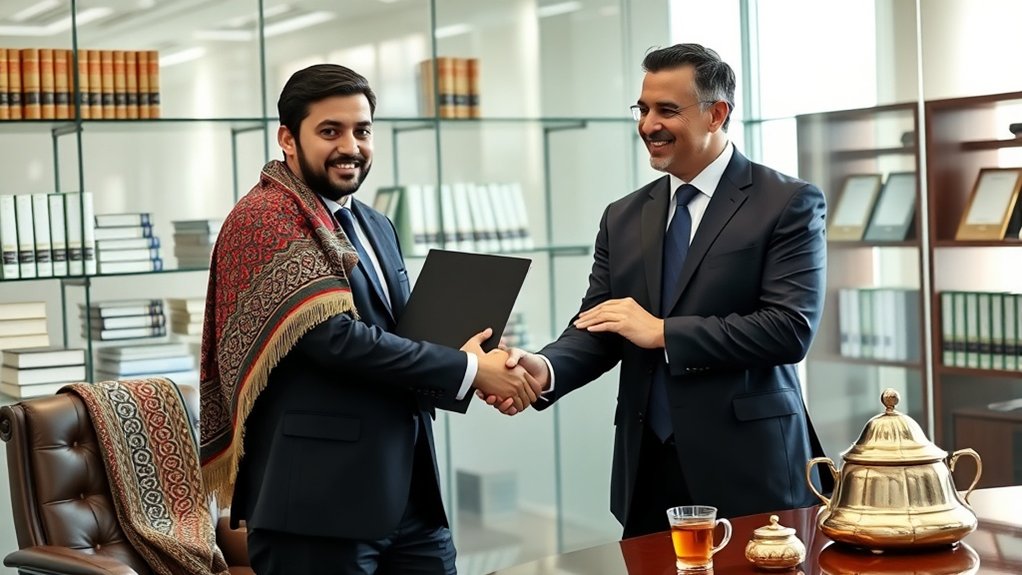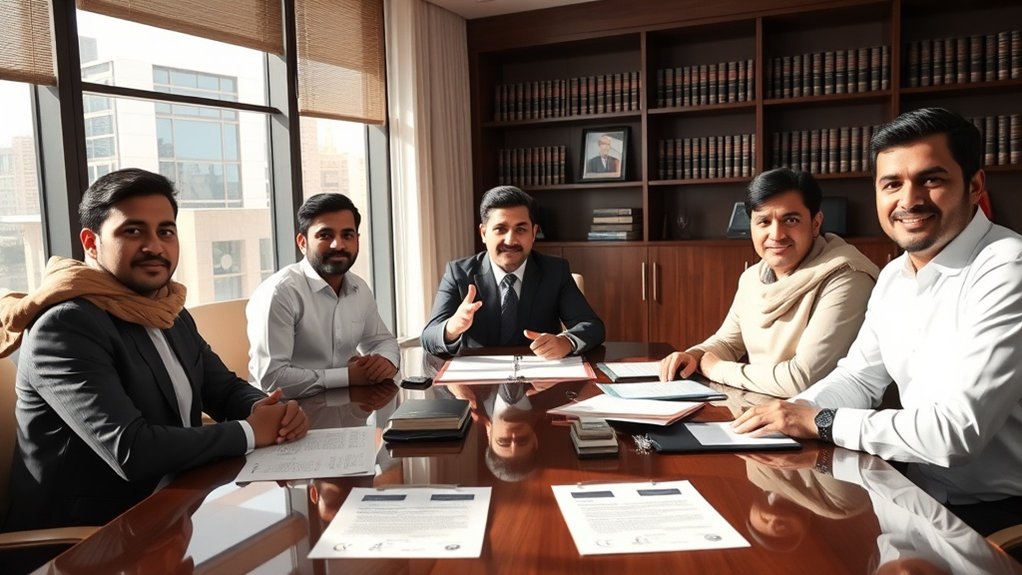If you’re an Afghan professional aiming to work in a regulated field, you know firsthand how confusing licensing requirements can be. Vieira Braga Advogados helps you cut through red tape, making sure you gather the right documents, get them translated properly, and understand the local rules. Their guidance could mean the difference between ongoing frustration and a clear path forward—but before you take your next step, there’s something else you need to consider.
Understanding the Licensing Landscape for Afghan Professionals

Whether you’re starting your career or continuing it in a new country, understanding the licensing landscape is essential for Afghan professionals. You’ll need to recognize that every regulated profession—whether it’s medicine, engineering, law, or education—comes with specific local rules. Each country or region sets its own requirements, so you can’t simply transfer your credentials without meeting their standards. Research what authority oversees your profession, as you’ll deal directly with them during the application process.
You should also pay attention to eligibility criteria, such as educational background, relevant work experience, and sometimes even language proficiency. It’s crucial to figure out whether your Afghan qualifications are recognized or if you’ll need additional coursework or exams. Don’t overlook any mandatory local training or licensing tests. By understanding these components, you can create a clear action plan and avoid unexpected delays. Being proactive in learning the standards gives you the best chance to succeed in your new environment. If you are also considering immigration options, exploring employment-based visa categories may provide alternative avenues for pursuing your professional goals in regulated fields.
Key Documentation and Translation Support
You’ll need to gather original documents that prove your education and professional experience. Make sure you follow the essential credential verification process and get certified translations for anything not in English. These steps are critical for your licensing application to move forward. Expert support from an immigration lawyer can help ensure organized documentation and improve your chances of a successful application.
Essential Credential Verification Process
Since professional licensing authorities require proof of your qualifications, gathering and verifying your academic credentials is a crucial first step. You’ll need original diplomas, transcripts, and relevant certificates from your university or professional school in Afghanistan. It’s important to double-check that your documents list your full name and graduation dates clearly.
Next, contact the institution that issued your credentials to confirm whether they’ll cooperate with verification requests from foreign licensing boards. Most authorities will ask for sealed envelopes or direct communication from the school to ensure authenticity. Stay organized by keeping digital copies as backups. If you face issues obtaining documents due to conflict or school closures, explore alternative evidence like older records or affidavits. With accurate and verifiable documents, you’ll strengthen your licensing application significantly.
Additionally, seeking advice from qualified immigration attorneys can help you navigate any obstacles in credential verification and maximize your chances of a successful licensing process.
Certified Translation Requirements
Once you’ve secured verifiable academic records, most licensing authorities will require these documents in the official language of the host country, often English. You’ll need to arrange for certified translations of your diplomas, transcripts, and professional letters. It’s not enough to simply translate them yourself or use online tools—regulatory bodies demand certified translations performed by sworn or officially recognized translators.
Check the licensing authority’s guidelines for approved translators or translation agencies. Obtain written confirmation the translations are accurate and complete. Keep both the original documents and their certified translations ready for submission. Having these on hand speeds up the application process and reduces setbacks. Always confirm the required format so your translation meets every technical detail the licensing board specifies. For further peace of mind and to avoid risks of incorrect documentation, consider consulting an immigration lawyer to review your paperwork prior to submission.
Bridging Educational and Professional Gaps

Now, you’ll need to tackle challenges around credential recognition and boost your language skills. It’s important to understand how your qualifications match local requirements and address any gaps. By strengthening your language proficiency, you’ll improve your chances of meeting licensing standards and workplace expectations. Seeking professional guidance can help increase the success of your application and ensure you meet all requirements.
Addressing Credential Recognition Challenges
How do you navigate the maze of credential recognition in a new country? If you’re an Afghan professional aiming for licensing in regulated fields, you’ll likely face hurdles. It’s not just about having a degree—authorities need to verify your education and professional experience against local standards. You may feel uncertain or frustrated, but you can take practical steps to bridge this gap. Start by understanding the requirements and gathering your original documents. Here’s what you need to focus on:
- Research the specific licensing criteria for your profession in your new country.
- Contact recognized credential assessment agencies to evaluate your academic and work history.
- Prepare certified translations of your diplomas and transcripts, if needed.
- Document your work experience and secure reference letters.
Persistence pays off—stay informed and proactive. Working with specialized legal assistance can help you navigate complex documentation processes and minimize the risk of delays or denials.
Enhancing Language Skills Proficiency
What role does language proficiency play in your journey to becoming a licensed professional abroad? It’s absolutely critical. If you’re aiming to work in a regulated field, strong language skills aren’t just helpful—they’re essential. Licensing bodies often require proof of proficiency, and you’ll need to understand complex legal, technical, and ethical terminology. Language barriers can limit your ability to communicate with clients, colleagues, and regulatory authorities.
Improving your language skills bridges educational gaps and strengthens your professional credibility. Consider enrolling in field-specific language courses or seeking mentorship from professionals fluent in the host country’s language. Engaging in practical conversations, workshops, and networking events can accelerate your learning. Prioritize consistent practice, and you’ll boost your confidence and enhance your ability to succeed professionally. If you’re uncertain about the required documents for residency or how language skills interact with licensing requirements, consulting a specialized lawyer can give you essential guidance and confidence in your professional transition.
Successfully passing regulatory exams and interviews can often feel like the most challenging part of the professional licensing process. You’re required to prove not just your knowledge, but also your professionalism and readiness for the local work environment. Focus on understanding the exam structure and practicing common interview questions relevant to your field. Make sure you understand the ethical standards and practical expectations unique to your profession in your new country.
To help you prepare effectively, follow these four steps:
- Review Official Materials: Study any official guides, sample tests, or recommended reading provided by the regulatory authority.
- Practice Under Exam Conditions: Simulate the exam environment to get comfortable with timing and pressure.
- Seek Feedback: Join study groups, attend prep courses, or consult mentors, especially those who’ve already succeeded.
- Research Local Practices: Familiarize yourself with country-specific laws, procedures, and case studies relevant to your profession.
Getting specialized legal support during this process can help you avoid mistakes and ensure that you’re fully compliant with all local licensing and immigration regulations.
Overcoming Legal and Bureaucratic Barriers

Although you’ve cleared exams and interviews, legal and bureaucratic hurdles can still delay your professional license. You might face extra document verification, complex translations, or requests for authentication from Afghan authorities. It’s common for licensing boards to require proof of prior education, professional standing, or background checks from your home country—each step can take time, especially if Afghan institutions are slow to respond or no longer fully operational.
To stay on track, gather all relevant original documents early and get certified translations. Double-check application forms and instructions to avoid errors. If you hit roadblocks, communicate proactively with regulatory bodies. Ask for clarifications or alternative procedures if certain documents aren’t accessible. Consider seeking advice from immigration lawyers or agencies familiar with Afghan credential challenges. Remember, persistence and thorough preparation are key. Diligently following up and responding promptly to requests will help you break through administrative bottlenecks and move closer to licensure. Consulting professionals with expertise in immigration law can help ensure your legal security and maximize your chances of success.
Building Professional Networks and Opportunities
How do you tap into new professional opportunities after relocating? Building a strong network isn’t just helpful—it’s essential for success in regulated fields. Start by reaching out to local professional associations, as they often provide resources for newcomers. Attend events, workshops, and seminars relevant to your industry to meet people and learn about job openings or licensing updates. Don’t hesitate to share your background and ambitions, as you never know who may offer a referral or mentorship.
To maximize your networking efforts, focus on these strategies:
- Join online communities – LinkedIn groups or Afghan diaspora organizations help connect you with professionals in your field.
- Attend informational interviews – Request meetings with local experts to gain insights and advice.
- Volunteer in your field – Offer your skills through community projects, boosting your experience and credibility.
- Leverage alumni networks – Connect with fellow graduates for guidance, support, and potential leads.
Working with an immigration lawyer can also increase your chances of building a network, as their personalized guidance helps you navigate both legal and professional aspects of settling into your new country.
Frequently Asked Questions
How Long Does the Entire Licensing Process Usually Take for Afghan Professionals?
You can expect the entire licensing process to typically take anywhere from several months to over a year, depending on your specific field, previous credentials, and how quickly you gather required documents. If you need to take language proficiency or equivalency exams, the timeline might extend. It’s smart to start early, stay organized, and keep in close contact with the licensing board to make the process as smooth and efficient as possible.
What Legal Assistance Costs Can Afghans Expect During the Licensing Process?
You can expect to pay for several types of legal assistance during the licensing process, such as application reviews, document translation, and representation in hearings or appeals. Costs vary depending on your needs and the complexity of your case, but fees might range from a few hundred to a few thousand dollars. It’s smart to ask for a fee schedule up front so you understand exactly what services you’re paying for and can budget accordingly.
Are There Community Organizations That Specifically Support Afghan Professionals?
Yes, you’ll find several community organizations dedicated to helping Afghan professionals succeed. Many local Afghan associations, immigrant welcome centers, and professional networks can provide mentorship, language support, networking events, and guidance through licensing processes. They often partner with established immigrant aid groups and offer culturally tailored resources. You shouldn’t hesitate to reach out, as they can connect you with peers, job leads, and advice suited to your specific profession and background.
Can Afghan Professionals Get Fee Waivers for Regulatory Applications?
Yes, as an Afghan professional, you can often apply for fee waivers when submitting regulatory applications. Regulatory bodies usually offer fee waivers or reduced fees for individuals facing financial hardship, newcomers, or refugees. Make sure you check the requirements on each organization’s website, gather any supporting documents, and include them with your application. Don’t hesitate to contact their customer service for clarification, since processes may differ between regulatory fields and regions.
How Do Licensing Requirements Differ Between Various Brazilian States?
Licensing requirements in Brazil vary from state to state, so you’ll need to check specific guidelines for where you plan to work. Some states might require additional exams, translations, or document validations, while others may recognize your credentials more readily. It’s important to research local councils or regulatory bodies, since they set their own standards and processes. Stay proactive, gather all necessary documents, and follow up regularly to ensure you’re meeting local requirements.
Conclusion
By working with Vieira Braga Advogados, you’ll gain the support you need to tackle every step of the professional licensing process. They’ll help you gather and translate documents, navigate complex regulations, and overcome legal hurdles. With their guidance, integrating into your profession becomes smoother and more achievable. Don’t let red tape hold you back—partner with experts who’ll make sure your skills and qualifications open new doors in your chosen field.






